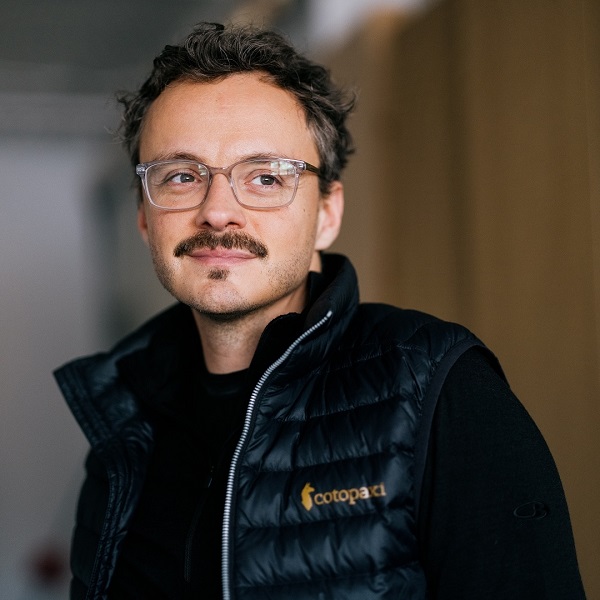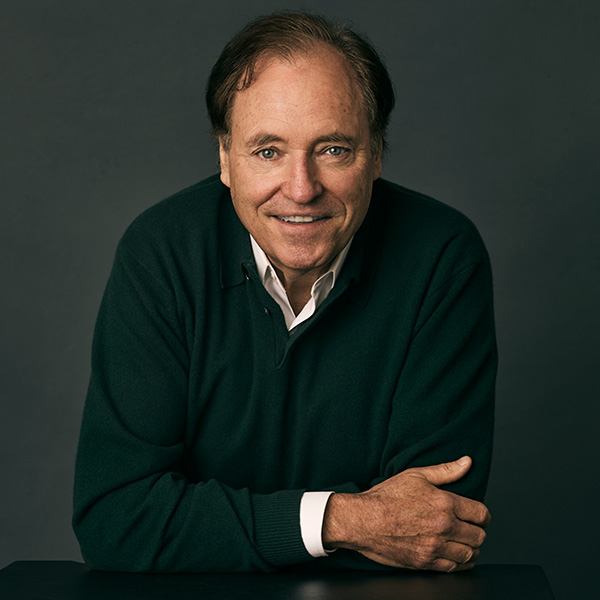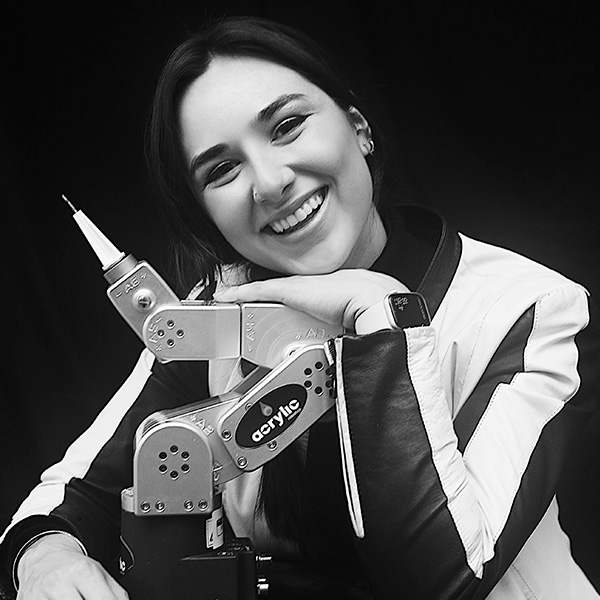Translated by: Julie Barlow, BA’91
When you look at Louis Morissette’s impressive resumé, one line seems a little out of place. The comedian, artist, actor and screenwriter—a well-known figure in Quebec who made his mark on Netflix with the 2021 film The Guide to the Perfect Family—studied… marketing and international business? And he did it at McGill?
Morrissette, BCom’95, swears the choice wasn’t a youthful mistake. “You can be an artist and have a knack for business,” he insists. “Art and planning go hand in hand.” The enterprising entertainer is the co-founder of the production company KOTV which employs close to 100 people.
Morissette admits that it took some effort to reconcile the two sides of his personality. “When I was a business student, I was involved in [doing] comedy shows. But when I [became a student at] the École national de l’humour, I was always asking them, ‘What’s our goal? What’s the [business] plan?’”
The 48-year-old comedian, who married the popular Quebec TV and radio personality Véronique Cloutier in 2001, grew up in an entrepreneurial family in Drummondville. His father, Jacques, founded Venmar, a major brand in the ventilation business. “I was supposed to take over the family business. My father used to say, ‘But you’re going to study first and learn English.’”
That’s what prompted the young Louis and two of his friends to pursue bachelor’s degrees in commerce at McGill, rather than study in Sherbrooke or Quebec City like most young Drummondville natives. “So there we were, three roommates, who could barely speak English, studying at McGill. Our first course was social psychology. We didn’t understand a thing! We said to ourselves, ‘This is not going to work.’”
It was in that very social psychology class that the friends from Drummondville ran into another French-speaking trio, “the boys from Joliette.” They were going through the same culture shock. One of them was Stéphane Rochon, BCom’95. “McGill taught me discipline and gave me a sense of organization and an incredible knowledge of Montreal, which I couldn’t have imagined getting in Drummondville,” says Morissette. “But above all, I got my best friend. Not a day goes by without us talking.”
Today, Rochon and Morissette have professional ties along with their friendship. Rochon chairs the KOTV board and serves as its chief digital strategist. He admits he was initially mystified by Morissette’s decision to steer away from a career in marketing, when he so clearly had a talent for it. “I couldn’t fathom why he’d settle for earning $18,000 a year as an artist! But in the end, it was the right choice. Louis has great business sense and great instincts.”
While he was making a name for himself on the stage and in the public eye, first as part of the trio Les Mecs comiques (“the Funny Guys”), and later in a host of roles in TV shows, Morissette was already showing an interest in the business side of things. He asks every producer who hires him to show him their budget—a very unusual request from an artist.
“I want to understand their business model. One day, a producer offered me a partnership. I ended up co-producing my own stuff before taking the leap as a producer in 2011.”
When asked what he’s most proud of, you’d expect the comedian to say his autobiographical series Les Morissette, or the half-dozen Bye-Bye’s (Quebec’s very popular New Year’s Eve TV specials) he’s appeared in, or the Véro & Louis foundation, which funds housing for adults with autism. But Morissette points to something else entirely.
“The thing I’m most proud of is being in a good position to take on future projects, but especially my ability to bounce back. Especially in 2004.”
During Morrisette’s 2004 annus horribilis, two series he was starring in were abruptly cancelled —one with Radio-Canada and the other with Quebec TV chain TVA. The same year, his father-in-law, the producer and impresario Guy Cloutier, was arrested (and later sentenced to three and a half years in prison). “It was a bad Christmas. Véro wasn’t ready to take over her father’s business and I had become toxic, professionally.”
But Morissette found a remedy for depression. He dreamed up a TV series about chartered accountants, and went on to write 52 episodes for it. The series, C.A., in which he played one of the main roles, was a hit on Quebec from 2006 and 2010, after which it was exported to France, Bulgaria and Kazakhstan.
Shortly after that, Morrissette founded his own company with director Alain Chicoine and producer Louis-Philippe Drolet, capitalizing on his entrepreneurial talents.
The company went through some growing pains to the point where Morissette seriously considered selling it. He went to his father, who had sold his own company in 1995 at the same age, for advice. “My father told me, ‘I regretted it. Don’t make that mistake’”
The solution was simple: the actor decided to expand the ownership of his production company, doubling the number of partners and giving them more responsibilities. “That’s what’s going to ensure the company’s long-term survival,” explains Morissette, who can now devote himself to what he loves most: pursuing his personal projects and thinking about the future of his company.
Morissette is rarely without a project or two on the go. Aside from The Guide to the Perfect Family, he also recently starred in the Ken Scott film Au revoir le bonheur (Goodbye Happiness), playing one of four brothers struggling to keep simmering family tensions in check after their father’s death. He also recently appeared in Libre échange, a series about a couple who regularly meet up for a drink before their weekly session with a marriage therapist. This fall, he will serve as the host of Le maître du jeu, a Quebec version of Taskmaster, a popular British game show involving comedians taking on bizarre challenges.
The entertainment world is changing and Morissette has no illusions about what’s going on. The industry still looks strong because Canadian platforms have been multiplying. Crave, illico and Tou.TV are all buying content to build their audiences—with government support. “It’s going to work for a while, and then it’s going to start working less,” predicts Morissette. “The platforms are going to start buying fewer shows and governments are going to start saying, ‘We can’t pay for everything.’ And then it’s going to be a total mess,” he warns.
Will he survive by finding new ways to export his projects? After all, The Guide to the Perfect Family, which Morrissette starred in and co-produced, went worldwide on Netflix. “It was mostly luck,” he says. “We came in at the beginning of the pandemic with a finished movie when the movie business was shutting down. But for two years now Quebec has been offering hundreds of projects to Netflix. And how many have they taken? Zero.”
Morrissette believes there is generally a direct link between the amount of money producers spend on a project, and their ability to reach foreign audiences. “Right now, we aim for $500,000 per hour produced, and that’s big. But to create something that can really stand out in the [international] market, you need to invest four times that.”
The rules of public funders, who are heavily involved in financing audiovisual production in Canada, don’t encourage exports at the moment. “In our discussions with public funders, Véro and I constantly stress that we need more money for sets, lighting and sound. If you make quiz shows with small, cheap sets, you end up with small programs that don’t travel. Maybe the solution for governments will be to support fewer productions, but with more money. But we’re not there yet.”
by Jean-Benoît Nadeau, BA’92 (Translated by Julie Barlow, BA’91)


